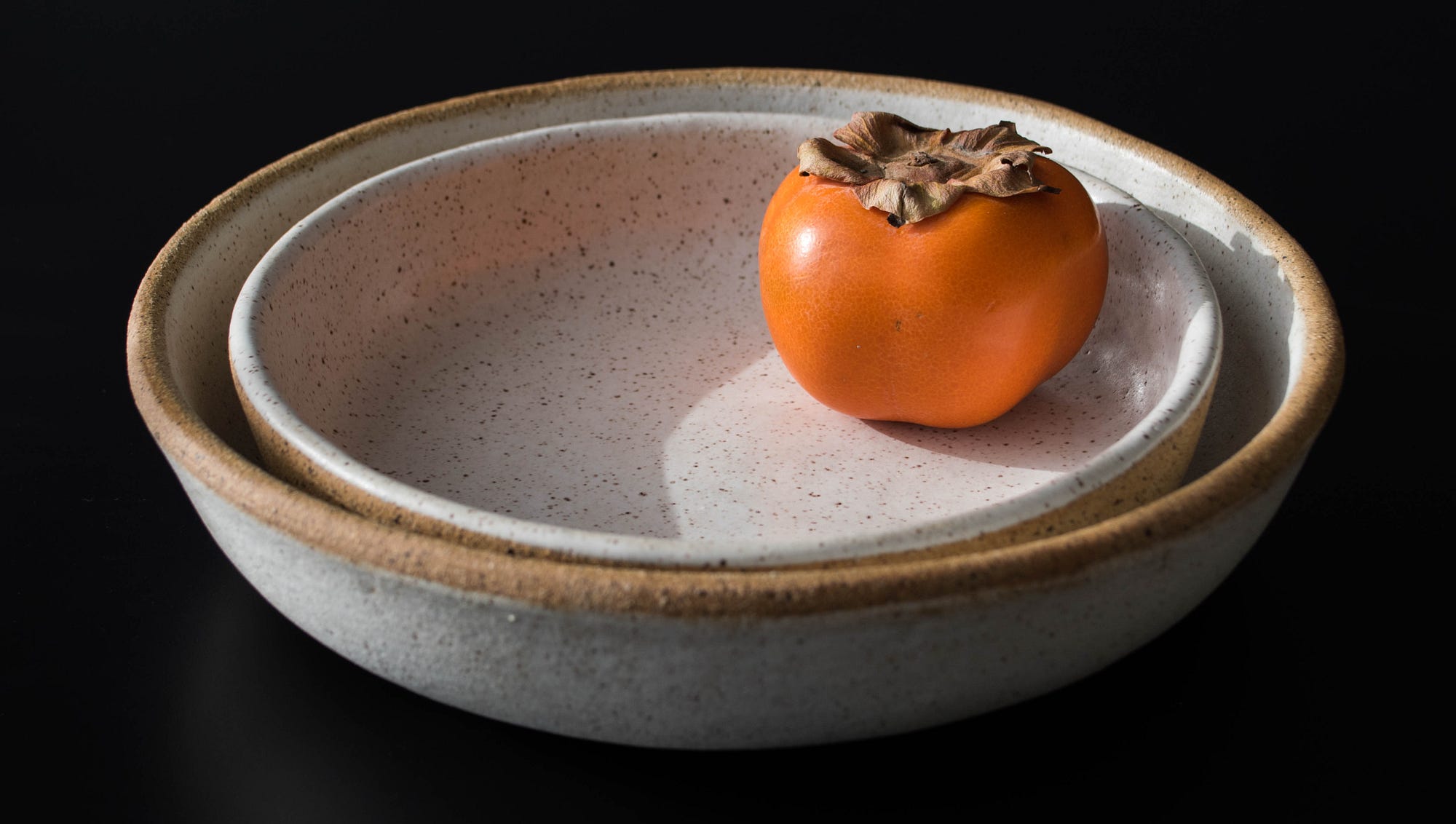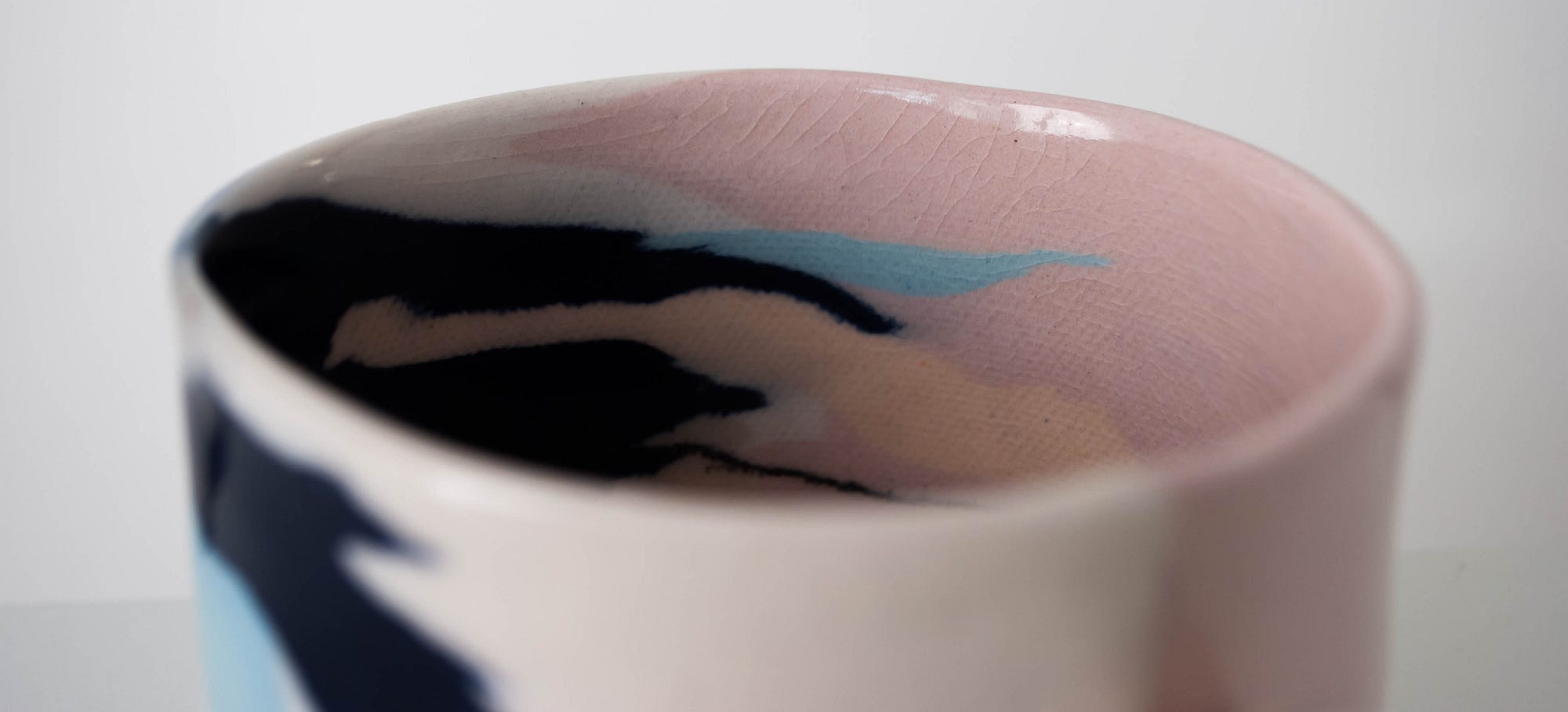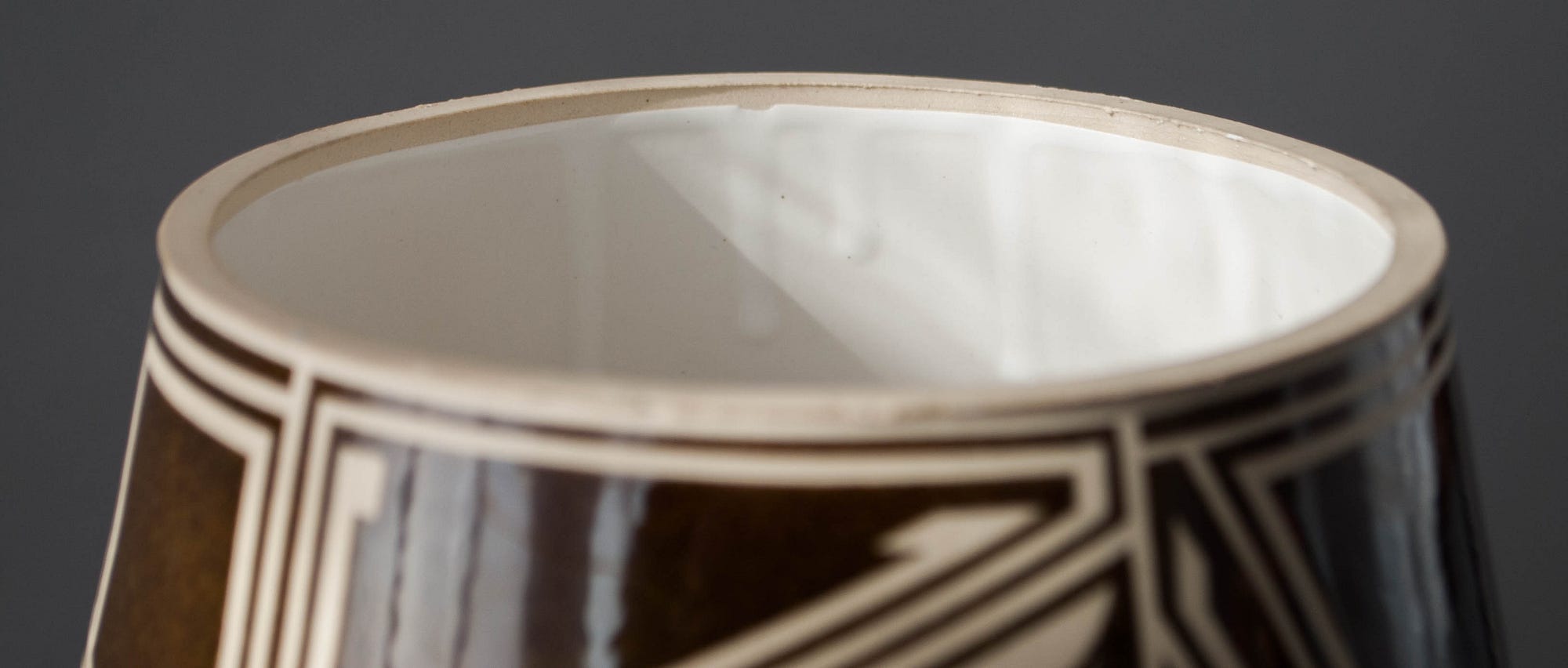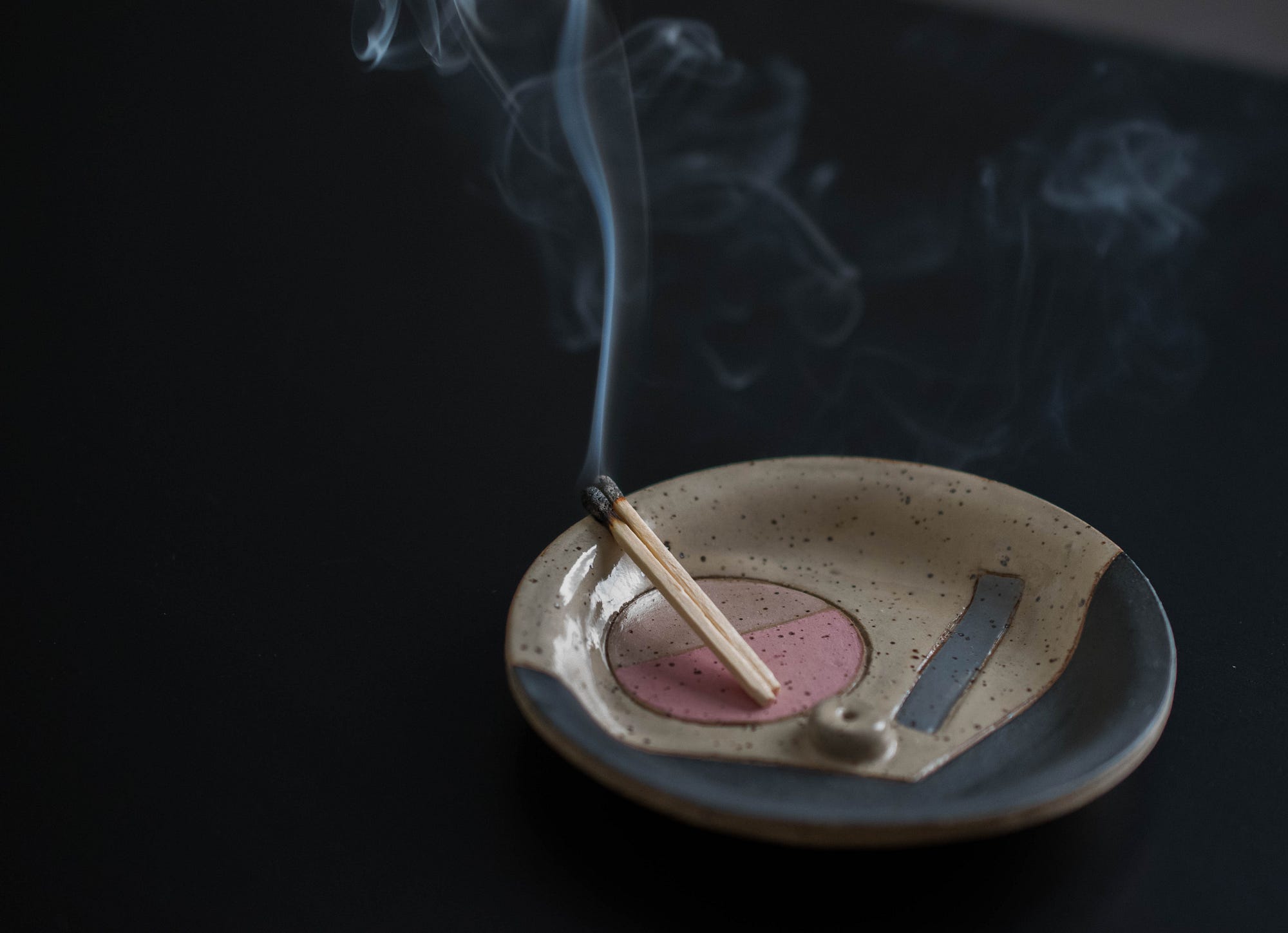
Growing up in California in the 80s and 90s, I never knew handmade work existed. If you asked me then what “handmade” meant, I’d likely have said it started and ended with paper mache and Elmer’s glue in our 2nd grade Arts & Crafts class (thank you, Mrs. Jensen!).
Our family relied on the convenience, availability, and affordability of mass-produced goods: we lived in a suburban home within a little cul-de-sac in San Jose, California. The home was built identically to many of our neighbors, since tract houses were made all at once. The furniture I used, the bed I slept on, the toys I played with, the dishes I ate off of were all produced by faceless factories — filling our home with impeccably regular products. Even the food I consumed was produced by factories, many meals consisting of frozen microwave dinners (hello, chicken pot pies) and the most-popular Lunchables.
It never occurred to me that those things used to be made by people at one point in time.

Over time, the regularity of and dependence on these products favored — or perhaps even cultivated — my own obsession with order and perfection. There was nothing more satisfying than a perfectly stacked set of plates or identical towers of pepperonis in each and every Lunchables Pizza package. It was reliable and consistent. Any can of Pringles would reliably create a stupid duck face, any Starbucks would reliably have the same flavor of burnt coffee, and the shelves at any Safeway grocery store would reliably be stocked with uniform packages of sliced bread.
This is the backdrop where my consumption patterns were formed. It’s where my values were created: Cheapness trumped anything. Convenience and reliable shipping of Linkin Park CDs led to an addiction to Amazon. Entitlement settled in; so much so that the fact cherries weren’t available year-round would irritate me — the nerve those cherries had to refuse growing whenever I wanted!

It wasn’t until over a decade later that I began to question my mass-produced life. It started when I thought about how repulsive it was that my dog Donut would eat dry (albeit impeccably regular) kibble from the same bag for every meal, and who knew how old that dusty bag of food really was. Where did it come from? Why wouldn’t it mold? What chemicals floated throughout Donut’s system? What chemicals floated around mine?
Then I began to question why so much of what I accumulated brought me so little joy. Why did I always crave what was next, when I already had so much? The latest Nikes, rare raw denim, more stacking plates. Nothing held a sense of lasting joy. Newness was the defining value of my things. Consumption begot more consumption.
 Later that year, I received a gift from my brother Matt: a handmade ceramic cup from Studio Arhoj. The craftsmanship on it wasn’t impeccable, but it was perfect. The glaze flowed naturally and dripped where it wanted to. The porcelain showed signs of trimming, done by a person. It was precious, and it had undeniable personality. It was a friend.
Later that year, I received a gift from my brother Matt: a handmade ceramic cup from Studio Arhoj. The craftsmanship on it wasn’t impeccable, but it was perfect. The glaze flowed naturally and dripped where it wanted to. The porcelain showed signs of trimming, done by a person. It was precious, and it had undeniable personality. It was a friend.
Finding something like that sparked an appreciation and curiosity for the handmade. I now recognize my most-gratifying coffees are out of irregular mugs, my favorite foods are made by people, and my most-rewarding hobby is baking naturally-leavened bread.

Throughout my own experiences, I’ve learned to understand why handmade work is so important.
-
Handmade is unique - and more human.
Every piece that is handmade is absolutely unique. There are infinite nuances from one piece to another, and those differences are what make handmade work effuse and resemble life. It’s those irregularities that signal to us that a person’s energy, time, and purpose went into the work.
Those irregularities are what make these pieces “perfect” — and as we learn to appreciate handmade work, our entire basis for “perfection” begins to move around us. It’s those same irregularities and unique perspectives in us that make us all human, interesting, and perfect.
-
Handmade supports people.
When we choose to buy something handmade, we know exactly who and what we are supporting. The florist we’ve seen for years, the eccentric potter with the eccentric pieces, the weird home-fermenter with a variety of misos — these are all the individuals who rely on our support.
So many small businesses, often family-run, have been crushed as collateral damage of mass-production, but by choosing something handmade, we are injecting life into a craft that has real, local, and familiar faces.
-
Handmade work values the process.
The makers behind handmade work typically don’t shy away from sharing their processes. There’s value in the work required to produce something, and the trial-and-error can be as interesting and impactful as the finished piece itself.
It’s a powerful reminder that our own processes, our journeys, our mundane everyday activities are just as — if not more — important than the results.
-
Handmade work provides connection.
We all need connection with one another, but our homes and things have become void of those connections, even as we interact with so many objects everyday. In our present-day consumption, we are drifting apart — apart from each other and from our objects. By using handmade pieces, we are instantly connected with makers, enjoying their work’s purpose, energy, and intent. We contribute to their lives, and they do the same for us.
-
Handmade is more sustainable.
Mass-production leads to unbelievable waste. In the name of profits, companies will do whatever it takes to lower costs, often harming the environment, their employees, and even their customers (eg: Donut’s kibble dog food).
Handmade pieces are made thoughtfully, where more raw materials and end products are used and enjoyed. The work is done by the people who value the work itself, and they produce pieces meant to improve the lives of the people they make their way to.
-
Handmade teaches patience.
Handmade work is not available all of the time. Just like the seasons, there is a cadence that takes makers and artists time to create what they do. Learning to embrace that cadence helps us gain empathy for the people, services, and environment around us.
-
Handmade showcases the beauty of ephemerality.
There will never be another piece identical to the handmade one you saw last week. That is the nature of something handmade, just like its uniqueness. But grasping the fact that we’ll never cross another piece that is exactly the same as the one right in front of us pushes us to be present, to enjoy what’s here, and cherish it for what it is. It’s a lesson from art, and one that can make the jump into our everyday lives.
-
Handmade work supports culture.
Supporting handmade work now ensures people will create handmade work in the future. It supports the passing-down of skills and traditions with age-old cultural significance. It also supports the courage makers exercise whenever they create and share something of their own voice.
As a product of an industrialized environment, I’m still grateful for the benefits of some mass-produced things. It’s a part of our world now, and I can enjoy more in my life than without it. But amidst this world-wide shift, we have to exercise our ability to hold on to and fiercely protect the industry of makers and artists, the work they produce, and the lessons they teach.

If you’d like to support handmade work and the makers behind it, SUPPLY UNICA was created to connect people with the art of handmade ceramics.
You can also follow our Instagram @supplyunica.